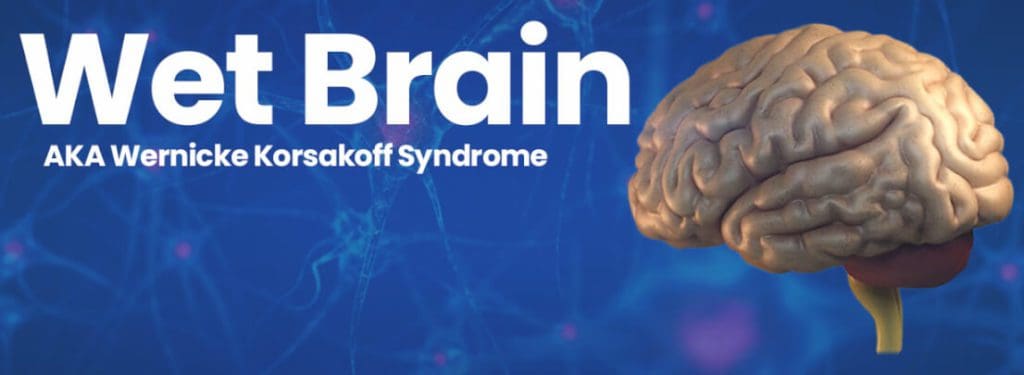Wet Brain
What is Wet Brain? Signs, Symptoms and Treatment for Wernicke Korsakoff Syndrome
Obviously “wet brain” is not a very scientific term or phrase. However, it is a very real condition that also goes by the more scientific names Wernicke-Korsakoff Syndrome(WKS), Wernicke’s Encephalopathy (WE), Korsakoff’s Psychosis and Beriberi.
People with a long history of alcoholism are prone to this chronic brain syndrome, which is caused by a deficiency of Thiamine (Vitamin B1) in the body.

Wet Brain Symptoms of Korsakoff Syndrome?
- Severe memory
- An Inability to form new memory
- confabulation, memory of events that never occured
- Ataxia, a staggering or irregular gait
- Confusion drowsiness and paralysis of eye movements
- Auditory and visual hallucinations
The syndrome is named after Carl Wernicke and Sergei Korsakoff. These doctors, working independent of one another, diagnosed two different stages of this condition in the late 1800s.
Here are 10 Facts to Understand About Wet Brain
Relationship to Thiamine or Vitamin B1
Alcohol interferes with the body’s ability to absorb Thiamine, or Vitamin B1, which is a complex vitamin essential to overall health. Thiamine is found in foods like whole grains, brown rice, asparagus, kale, pork, beef, chicken, eggs and potatoes.
Thiamine Deficiency
A severe lack of thiamine can cause wet brain even in the absence of chronic alcoholism. For instance, periods of vomiting from “morning sickness” or bulimia can cause a thiamine deficiency. Even a diet solely consisting of polished white rice can cause wet brain.
Sudden Onset
Korsakoff Syndrome has a sudden onset, and does not occur gradually. It can be brought on by a large dose of glucose in someone with a Vitamin B1 deficiency. It’s hazardous for malnourished drinkers to consume a lot of sweets and foods with no vitamins.
Glucose Drip
This condition has been unwittingly caused by physicians administering a glucose drip to under-nourished alcoholics in their care.
Two Stages of Development
The syndrome is generally believed to happen in two stages.
First, Wernicke’s Encephalopathy presents itself as mental confusion, staggering, and the paralysis of eye movements.
This is followed by Korsakoff’s Psychosis, which is the loss of memory function in the brain.
Brain Damage or Death
Failure to diagnose this syndrome leads to death in 20 percent of cases, while brain damage occurs in 75 percent of cases.
It Can Be Reversible If Caught Early
If caught early, during the Wernicke’s Encephalopathy phase, thiamine injections can sometimes reverse the damage and allow patients a full recovery. After the second stage of this condition, the injury to the brain is not reversible.
How is it Treated?
Wernicke-Korsakoff Syndrome is generally treated with thiamine and abstinence from alcohol. Over time there can be some improvements, but total recovery is very unlikely.
How Many People Does it Affect?
The National Institute of Health’s Office of Rare Diseases lists Wernicke-Korsakoff syndrome as a rare disease due to the fact it affects less than 200,000 in the United States.
WetBrain Prevention
Preventing wetbrain is a matter of limiting alcohol intake or abstaining from it all together, while maintaining a nutritional diet that includes a regular intake of Vitamin B1.
Alcohol is the oldest and most widely abused drug in the world. It’s estimated that 15 million people in U.S. alone are currently struggling with alcohol abuse and dependence.
Treatment for Wet Brain
Proper treatment can help those struggling with addiction lead happy, healthy and sober lives.
No one should ever have to endure the debilitating effects of a severe brain condition caused by prolonged use of alcohol.
If you suspect that someone you know may be experiencing Wernicke-Korsakoff Syndrome symptoms, it’s imperative that you get treatment for them immediately.
Learn more about our Alcohol Rehab Programs.